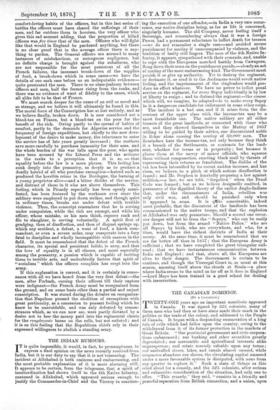THE INDIAN RUMOURS.
IT is quite impossible, it would, in fact, be presumptuous, to express a final opinion on the news recently received from India, but it is our duty to say that it is not'reassuring. The incident at Allahabad is both ominous and embarrassing, and the most probable explanation of it is more alarming still. It appears to be certain, from the telegrams, that a spirit of insubordination had shown itself in the 4th Native Infantry, cantoned in Allahabad, which appeared serious enough to justify the Commander-in-Chief and the Viceroy in sanction-
ing the execution of one offender,—in India a very rare occur- rence, our native discipline being, as far as life is concerned, singularly humane. The old Company, never feeling itself a Sovereign, and remembering always that it was a foreign Power, had a permanent reluctance to inflict death for treason —we do not remember a single case—and avoided severe punishment for mutiny if unaccompanied by violence, and the tradition of laxity still lingers. The men of the 4th Native In- fantry, it appears, sympathized with their comrade, and, unable to cope with the Eurcpeans marched hastily from Cawnpore, flung down their arms on the punishment parade,—clearly an act of mutiny of the most embarrassing kind. The Government must punish it or give up authority. Yet to destroy the regiment, or decimate it, or send it to the Andamans would revolt native feeling, and the imprisonment of the ringleaders would pro- duce no effect whatever. We have no power to inflict penal service on the regiment, for every Sepoy individually is by law at liberty to resign ; and to disband the regiment—the course which will, we imagine, be adopted—is to make every Sepoy in it a dangerous candidate for enlistment in some other corps.
The incident is a bad one, and if it arises from the dis- content of the upper class with the income-tax may be a most formidable one. The native soldiery are all either tenants Of the great landlords, or connected with those who are, and they showed themselves in the Mutiny of 1857 willing to be guided by their advice, one discontented noble in Behar alone causing the mutiny of 30,000 men. The Zemindars hate the income-tax, not only because they think it a breach of the Settlements, or contracts for the land- rent, whether for terms or in perpetuity ; but because it places them at the mercy of minor officials, who squeeze them without compunction, exacting black mail by threats of representing their returns as fraudulent. The dislike of the tax has been intensified by its recent sudden increase, and has risen, we believe, to a pitch at which serious disaffection is feared ; and Mr. Stephen is hurriedly preparing a law against sedition,—a law, we are told, " forgotten " when the Penal Code was framed ; but as we believe designedly omitted, in pursuance of the dignified theory of the earlier Anglo-Indians that, under the circumstances of India, rebellion was only civil war, and should be punished only when it appeared in arms. It is cittite conceivable, indeed most probable, that the discontent of the landlords has been communicated to the native troops, and that the explosion at Allahabad was only premature. Should a second one occur, our danger will not be from the " Sepoys," who can be easily put down, but from the armed "Native Police," who are all Sepoys by birth, who are everywhere, and who, for a time, would have the richest districts of India at their mercy. At the same time, it must be remembered that we are far better off than in 1857 ; that the European Army is sufficient ; that we have completed the great triangular rail- road ; that we have instantaneous communication between India and England ; and that, above all, the Europeans are alive to their danger. The Government is certain to be cautious, and though the Viceregal Court is, as usual at this season, amusing itself above the clouds at Simla—a place where India seems to the mind as far off as it does in England —Lord Mayo has been trained in a good school for dealing with insurrection.






























 Previous page
Previous page